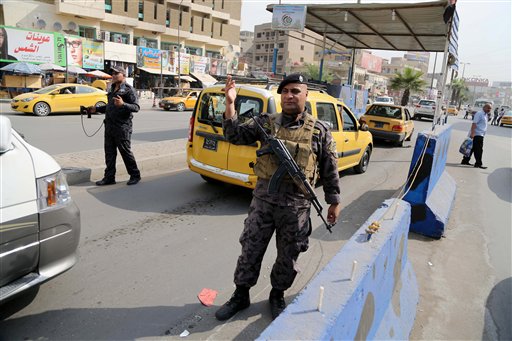
Iraqi policemen work at a checkpoint in central Baghdad, Iraq, Thursday, Oct. 31, 2013. Iraqi Prime Minister Nouri al-Maliki is scheduled to speak about his country’s plight to a Washington audience tonight, a day ahead of a White House meeting with President Barack Obama. The two leaders plan to discuss Iraq’s request for more weapons, training and manpower to battle deadly attacks by a resurgent al-Qaida in Iraq. AP
BAGHDAD — Violence across Iraq killed nearly 1,000 people in October, the United Nations said Friday, as the world body’s representative there called on leaders to take bold action to stop the “current mayhem” gripping the country.
Car bombings, shootings and other attacks have been on the rise all year, intensifying fears that widespread sectarian conflict again may overwhelm the country. Widespread chaos nearly tore the country apart in the aftermath of the U.S.-led invasion that ousted Saddam Hussein in 2003.
The bloodshed accelerated sharply after a deadly April 23 crackdown by security forces on a Sunni protest camp in a northern Iraqi town. That set off near-daily attacks, mostly by Sunni extremists and al-Qaida militants determined to undermine the country’s Shiite-led government.
U.N. mission chief Nickolay Mladenov, as the body announced the figures, simply said: “Indiscriminate violence is constant.”
“Every day, every week, every month dozens, if not hundreds of innocent Iraqis are killed or deeply wounded,” he said. “This is senseless.”
The U.N.’s report said 979 people were killed in October — the same number as in September. Out of those, 852 were civilians while 127 were Iraqi soldiers and members of the police force.
Also, the U.N. said 1,902 Iraqis were wounded in attacks across the country last month — a drop of more than 200 from September, when 2,133 Iraqi were wounded.
Baghdad was the worst affected province, with 411 killed and 925 wounded. It was followed by the volatile Ninevah province, where 188 people were killed and 294 were wounded.
Ammar Ibrahim, a Sunni in northern Baghdad, said that the number of deadly attacks will grow in number unless the Iraq politicians stop caring only about their personal ambitions.
“The solution for Iraq’s insecurity will never be a military one. Violence will stop when government senior officials understand that the Iraqis are more important than posts or elections,” he said.
On Thursday, Iraqi Prime Minister Nouri al-Maliki warned in Washington that terrorists “got a second chance” to thrive in Iraq, largely as the result of the rise of al-Qaida fighters in neighboring Syria’s civil war. He said the world needs to help Iraq deal with its deadly insurgency.
During a meeting in Washington on Friday, Al-Maliki is expected to appeal to President Barrack Obama for more U.S. assistance, including weapons and intelligence help, in order to defeat the growing insurgency in Iraq.
Yassir Mohammed, a Shiite government employee in eastern Baghdad, said that al-Maliki is mainly in Washington in order to get the U.S.’ approval to run for a third term.
Mohammed also said that al-Maliki’s refusal to grant legal immunity for U.S. forces was a “grave mistake” committed by al-Maliki. Nearly two years ago, his government refused to let U.S. forces remain in Iraq with legal immunity that the Obama administration insisted was necessary to protect troops.
“Everybody, except al-Maliki and his government, knew at that time that Iraqi security forces are helpless in front of the powerful terrorist groups,” Mohammed said.
Violence in Iraq raged on Friday. Gunmen opened fire on a security checkpoint in the northern city of Mosul, killing one soldier and one civilian passer-by, police officials said. Also in Mosul, a soldier was killed and three were wounded when a roadside bomb struck their convoy, authorities said.
A hospital official confirmed the death toll for both attacks. All officials spoke on condition of anonymity because they were not authorized to talk to journalists.